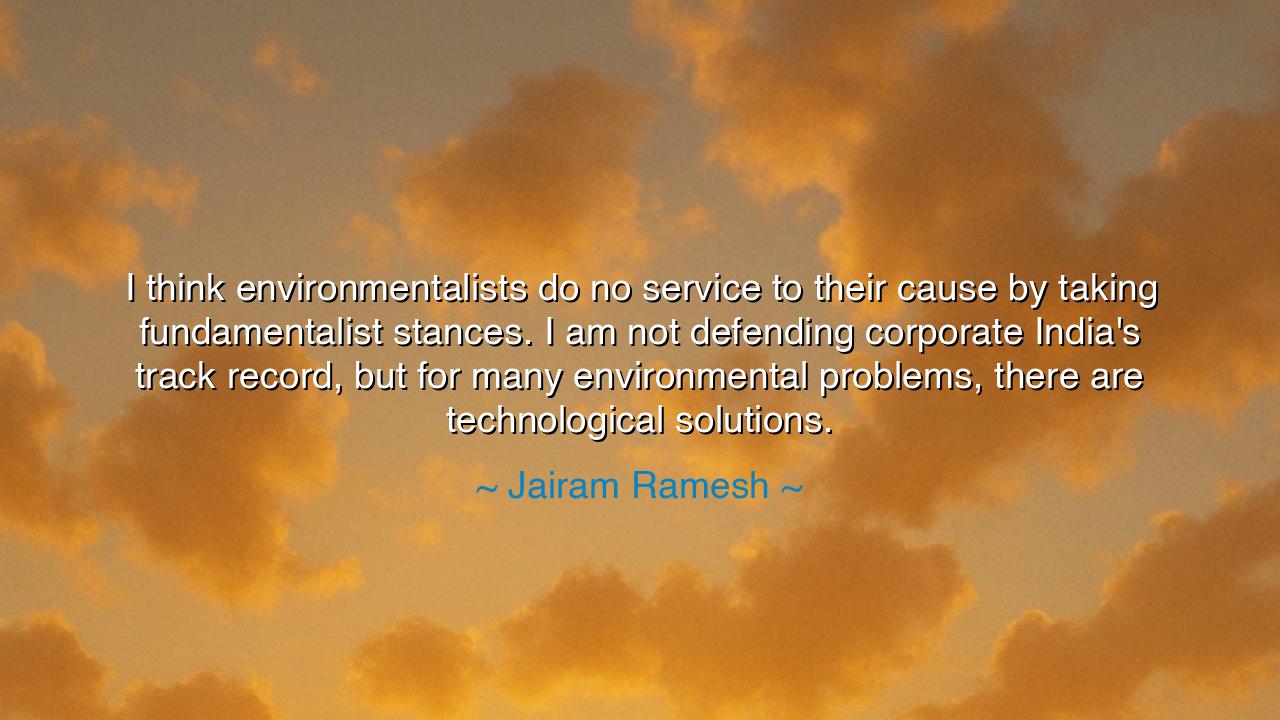
I think environmentalists do no service to their cause by taking
I think environmentalists do no service to their cause by taking fundamentalist stances. I am not defending corporate India's track record, but for many environmental problems, there are technological solutions.






In the thoughtful voice of balance and reason, Jairam Ramesh once declared: “I think environmentalists do no service to their cause by taking fundamentalist stances. I am not defending corporate India’s track record, but for many environmental problems, there are technological solutions.” Within this statement lies the heart of a timeless struggle — the tension between idealism and pragmatism, between the purity of conviction and the necessity of compromise. His words speak not only to his nation, but to all who stand at the crossroads of progress and preservation.
Ramesh, a former Minister of Environment and Forests of India, uttered these words from experience, not abstraction. He witnessed firsthand the clash between environmental activists, who fought to protect the sacred forests and rivers of India, and industrial forces determined to lift millions from poverty through development. His insight was born from this battlefield of values: he saw that to save the earth, one must also understand humanity’s hunger for growth. His statement is not a dismissal of activism, but a plea for wisdom — for solutions that unite rather than divide.
When he warns that “fundamentalist stances” harm the environmental cause, he calls out the danger of rigidity. Throughout history, noble movements have faltered when their zeal turned to intolerance. To stand for the planet is righteous, but to reject all dialogue, all innovation, and all cooperation is to isolate the cause itself. Nature thrives in balance — and so must human action. The environmentalist who cannot listen, and the industrialist who will not change, are both trapped in the same blindness.
Yet Ramesh’s wisdom shines in his second declaration: that “for many environmental problems, there are technological solutions.” Here, he bridges the ancient with the modern, echoing the principle that knowledge, rightly used, can restore harmony. Just as our tools once wounded the earth, they may now be used to heal it — through renewable energy, sustainable agriculture, and green infrastructure. The same fire that burned forests can light the path to renewal, if guided by conscience and intellect.
Consider the example of Israel’s water revolution. Faced with drought and desolation, the nation turned not to despair, but to technology — creating drip irrigation systems that transformed barren soil into fertile ground. In this way, a land once scorched by scarcity became a testament to human ingenuity serving the environment. This is what Ramesh calls us to see: that the struggle for sustainability need not be a war between man and nature, but a partnership born of respect and invention.
His words also carry a moral undercurrent. Corporate India, like many industries across the world, has indeed scarred the land — polluting rivers, uprooting forests, displacing communities. Ramesh does not excuse these sins; rather, he challenges corporations to rise beyond them. The technological solutions he envisions are not bandages for exploitation, but instruments of transformation. In his view, progress must no longer be measured by profit alone, but by the health of the world it inhabits.
The lesson for every generation is clear: righteousness without flexibility leads to isolation, while innovation without morality leads to ruin. The wise path lies between — in dialogue, collaboration, and the creative marriage of science and ethics. Let environmentalists embrace engineers, and let industry embrace the earth. Let humanity move forward not as conqueror or victim, but as custodian.
Thus, Jairam Ramesh’s words endure as a hymn to balance. “There are technological solutions,” he reminds us — but technology must serve truth, and truth must remain compassionate. To protect the earth, we must think not as enemies divided by ideology, but as stewards bound by destiny. For the planet will not be saved by extremism or apathy, but by the courage to see that in harmony, there lies hope.






AAdministratorAdministrator
Welcome, honored guests. Please leave a comment, we will respond soon